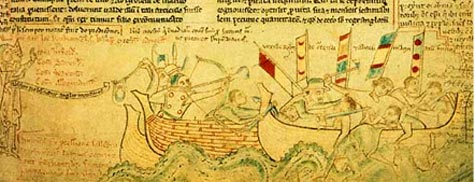 The death of Eustace at the Battle of Sandwich
The death of Eustace at the Battle of Sandwich
The Oxford Dictionary of National Bi0graphies features an intriguing character from history today – Eustace the Monk, a Benedictine monk from the 13th century who was also a sea captain, a mercenary and a pirate. Quite a resume. A romance biography written about Eustace around 1225 by an unknown poet from Picardy, is said to have influenced the medieval myths of Robin Hood.
Eustace was born a younger son of Baudoin Busket, a lord of the county of Boulogne. According to his biography, he went to Toledo, Spain, studied black magic there, returned home to become a Benedictine monk at St Samer Abbey near Calais, and then left the monastery to avenge his murdered father. Other evidence, however, suggests that his father’s death occurred soon after 1190. That evidence proves that by 1202 Eustace was the seneschal and bailiff of the count of Boulogne, Renaud de Dammartin and that in c. 1204, the two quarrelled and, accused of mishandling his stewardship, Eustace fled and was declared an outlaw. Renaud confiscated his lands and fields; Eustace burned two mills in retaliation.
He then became a pirate in the English Channel and the Strait of Dover, both for his own purposes and as a mercenary of France and England. John of England employed him intermittently from 1205 to 1212, against Philip II of France. The biography asserts that John gave him command of thirty ships at the start of this assignment. This employment involved Eustace and his brothers raiding the Normandy coast and establishing bases in the Channel Islands (he and his men held Castle Cornet in Guernsey for a considerable period). When he raided English coastal villages, King John briefly outlawed him, but soon afterwards issued a pardon because he needed his services.
However, Eustace switched sides in 1212 (the biography puts it down to Eustace’s enemy Renaud de Dammartin allying himself with John and poisoning John’s mind against Eustace) and raided Folkestone when English troops seized his Channel Island bases. When civil war broke out in England in 1215, he supported the rebel barons and ferried Prince Louis of France across the Channel to help them in 1216.
In August 1217, whilst ferrying much-needed reinforcements to Louis, Eustace met an English fleet under Hubert de Burgh sailing out of Dover. In the ensuing Battle of Dover, Eustace wrought havoc among his former allies, until the English blinded the French with powdered lime. English troops boarded his ships and defeated his men in mêlée. Eustace, his flagship and some other ships managed to escape, but his ship was surrounded on 24 August 1217 in the Battle of Sandwich by Philip d’Aubigny’s English fleet of Cinque Ports ships. Eustace was found hiding in the ship’s bilges and offered huge sums for his life, which his captors refused, since he had made himself so hated by the English crews. Instead, they allowed him merely the choice between the ship’s rail or the side of the trebuchet (carried as deck-cargo to England) as his execution site. (Matthew Paris includes the beheading but does not specify which he chose). His brothers survived, and continued to hold his Channel Islands base
